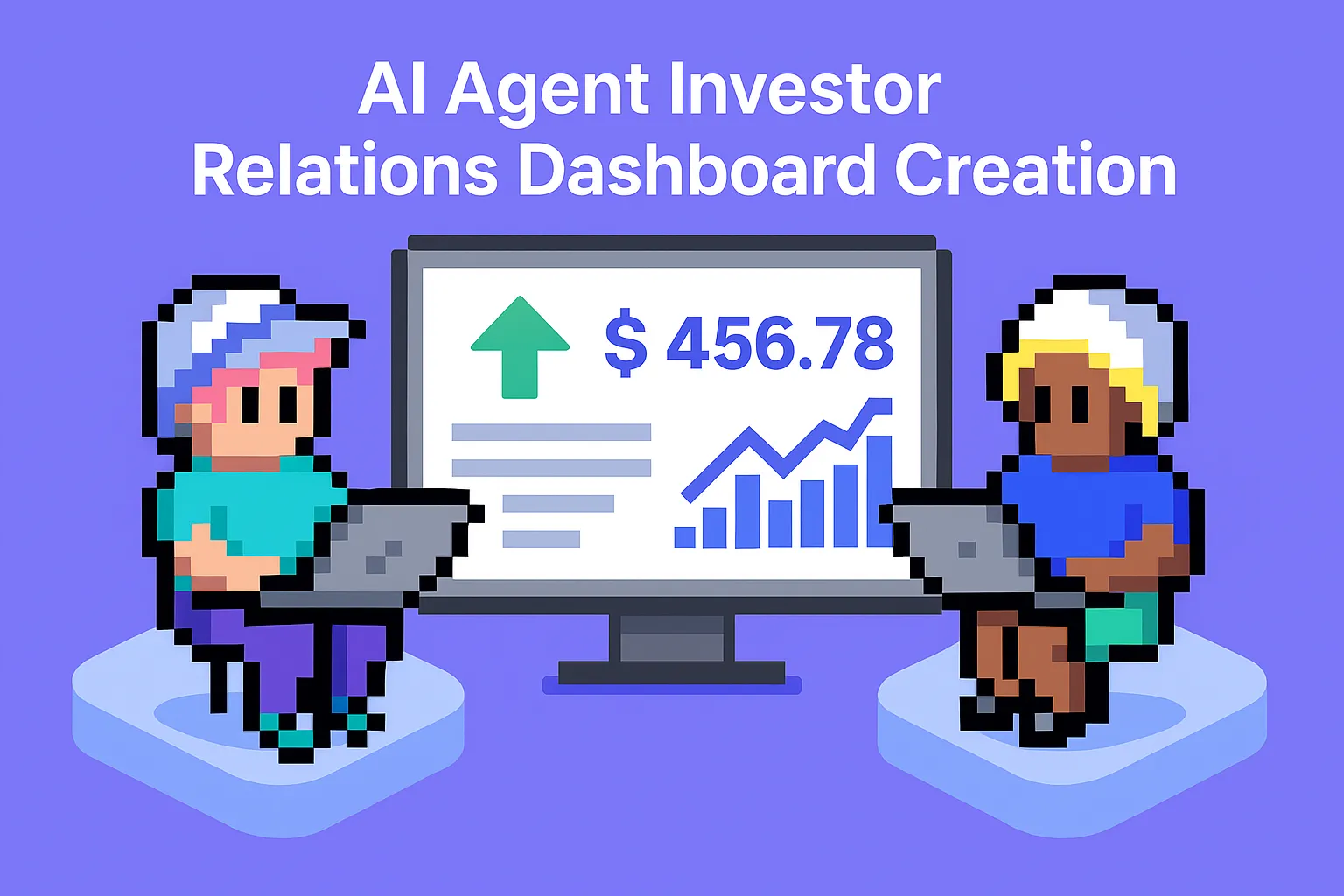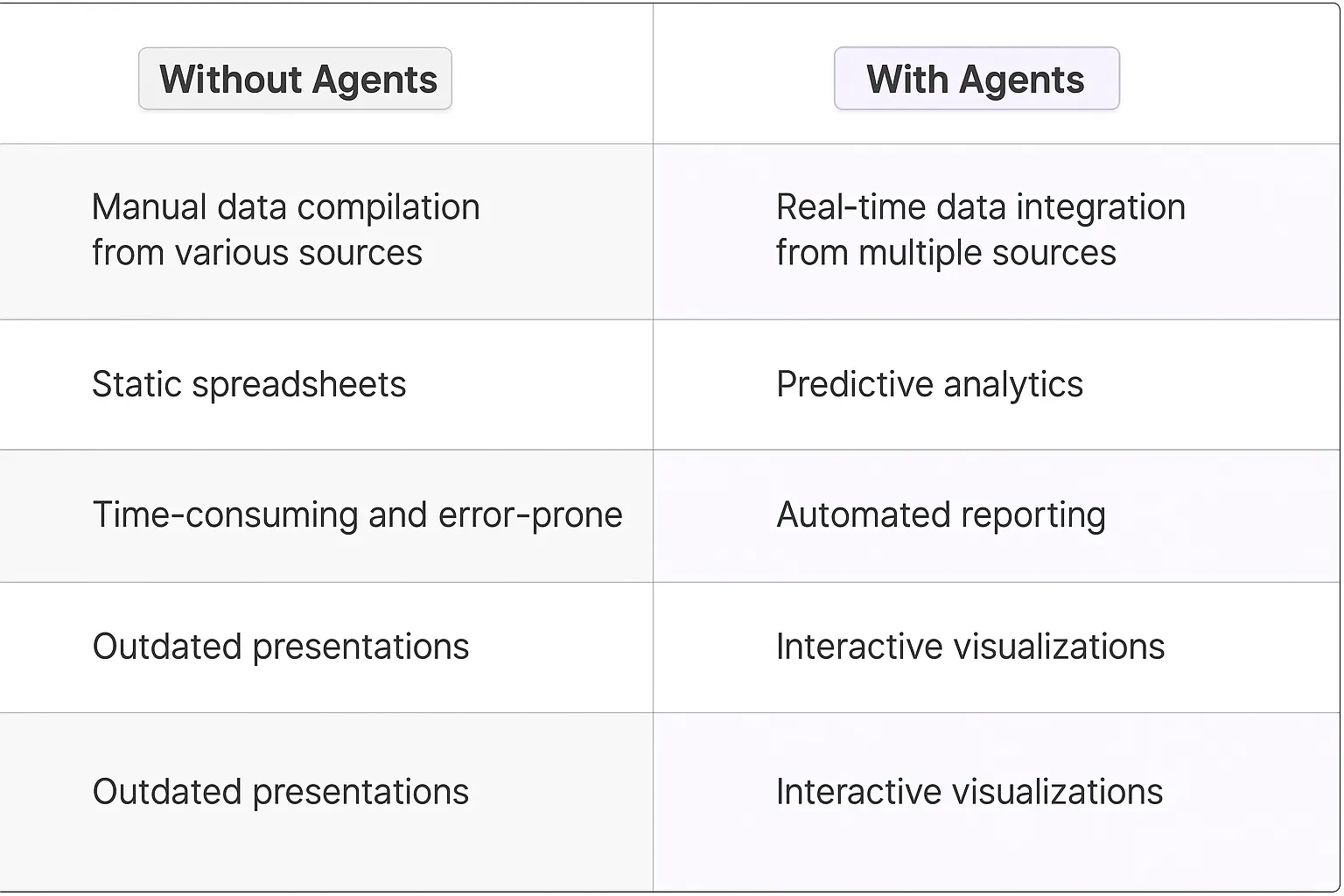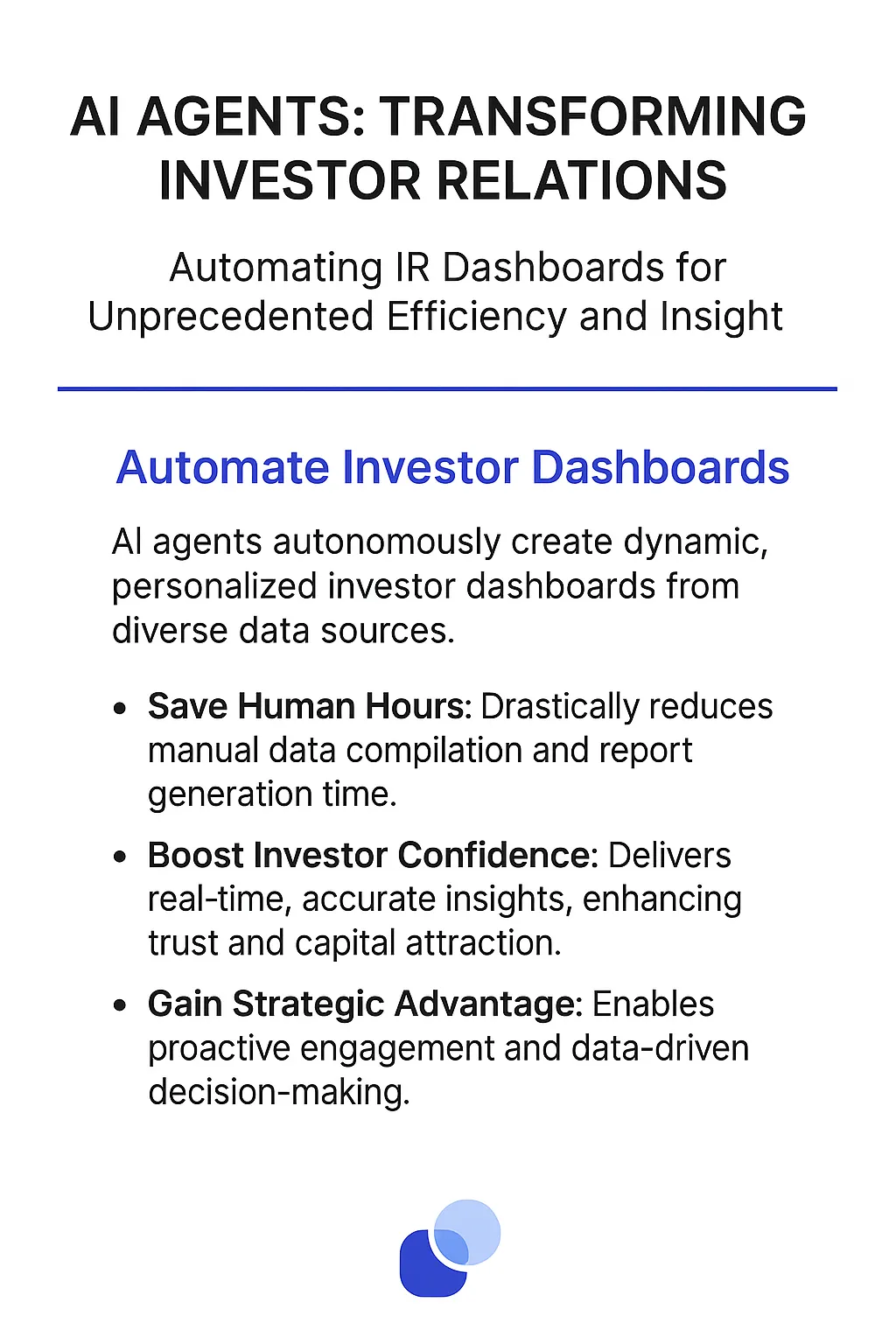Investor Relations Dashboard Creation AI Agents
The Evolution of Investor Relations Dashboards
What is Investor Relations Dashboard Creation?
Investor Relations Dashboard Creation is the process of developing comprehensive, data-driven visual interfaces that provide key financial metrics, performance indicators, and market insights to investors and stakeholders. These dashboards serve as a crucial communication tool, offering a real-time snapshot of a company's financial health, market position, and growth trajectory.
Key Features of Investor Relations Dashboard Creation
- Real-time data integration from multiple sources
- Interactive visualizations of financial metrics
- Customizable views for different investor profiles
- Predictive analytics and trend forecasting
- Automated reporting and narrative generation
- Benchmarking against industry peers
- Compliance with financial reporting standards

Benefits of AI Agents for Investor Relations Dashboard Creation
What would have been used before AI Agents?
Before AI agents entered the scene, creating investor relations dashboards was a painstaking process. Finance teams would spend countless hours manually compiling data from various sources, wrestling with complex spreadsheets, and struggling to present information in a visually appealing way. It was like trying to solve a Rubik's cube blindfolded – frustrating, time-consuming, and prone to errors.
Companies often relied on a mishmash of tools: Excel for data crunching, PowerPoint for presentations, and maybe some basic data visualization software if they were lucky. The result? Static, outdated dashboards that failed to capture the dynamic nature of financial markets and investor sentiment.
What are the benefits of AI Agents?
Enter AI agents – the secret weapon for creating killer investor relations dashboards. These digital teammates are like having a team of financial analysts, data scientists, and designers working 24/7 to deliver insights that matter. Here's why they're a game-changer:
- Real-time data integration: AI agents can tap into multiple data sources simultaneously, from stock prices to social media sentiment, giving you a live pulse on your company's market position.
- Predictive analytics: These agents don't just show you what's happening now; they use machine learning to forecast trends and potential market shifts, helping you stay ahead of the curve.
- Natural language processing: Forget about sifting through dense financial reports. AI agents can summarize key points and translate complex financial jargon into plain English, making your dashboards accessible to a wider audience.
- Customization at scale: Each investor is unique, and AI agents get that. They can tailor dashboards to individual preferences and risk profiles, creating a personalized experience that traditional methods simply can't match.
- Anomaly detection: AI agents act like financial watchdogs, alerting you to unusual patterns or discrepancies that human eyes might miss. This early warning system can be crucial for risk management.
- Interactive visualizations: Static pie charts are so last decade. AI agents can create dynamic, interactive visualizations that allow investors to dive deep into the data, uncovering insights on their own.
The bottom line? AI agents are transforming investor relations dashboards from boring spreadsheets into powerful, interactive tools that drive engagement and inform better decision-making. They're not just crunching numbers; they're telling your company's financial story in a way that resonates with investors and sets you apart in a crowded market.
As someone who's seen countless startups and technologies come and go, I can confidently say that AI agents in investor relations are not just a fleeting trend. They're a fundamental shift in how companies communicate with their stakeholders. Those who embrace this technology will find themselves with a significant edge in attracting and retaining investors in an increasingly competitive landscape.

Potential Use Cases of AI Agents for Investor Relations Dashboard Creation
Let's dive into how AI agents can transform investor relations dashboard creation. These digital teammates aren't just tools; they're game-changers that can redefine how companies communicate with investors.
Processes
- Data Integration and Cleansing: AI agents can pull data from various sources, clean it up, and integrate it seamlessly into your dashboard. They'll handle the grunt work, freeing you to focus on strategy.
- Real-time Market Analysis: These agents can continuously monitor market trends, competitor performance, and economic indicators, updating your dashboard in real-time. It's like having a tireless analyst working 24/7.
- Predictive Modeling: AI can crunch historical data and current trends to forecast future performance. This isn't just number-crunching; it's giving you a crystal ball for investor conversations.
- Customized Reporting: Different investors need different insights. AI agents can tailor dashboards on the fly, ensuring each stakeholder gets the most relevant information.
Tasks
- KPI Tracking: AI agents can monitor key performance indicators, alerting you to significant changes or trends. They're your early warning system for both opportunities and challenges.
- Sentiment Analysis: By scanning news articles, social media, and analyst reports, AI can gauge market sentiment about your company. It's like having a finger on the pulse of investor opinion at all times.
- Automated Narrative Generation: These digital teammates can draft initial reports and summaries based on dashboard data. They're not replacing human insight, but they're giving you a solid starting point.
- Comparative Analysis: AI can benchmark your company against peers, providing context that investors crave. It's not just about your performance; it's about how you stack up in the market.
The beauty of these AI agents is their ability to learn and improve over time. They're not static tools but evolving partners in your investor relations strategy. As they process more data and receive feedback, they'll become increasingly sophisticated, offering insights that might not be immediately obvious to human analysts.
But here's the kicker: the real power comes when you combine these AI capabilities with human expertise. The AI handles the data heavy-lifting, pattern recognition, and initial analysis. This frees up IR professionals to focus on relationship building, strategic communication, and nuanced interpretation of the data.
In essence, AI agents for investor relations dashboards aren't just about presenting data more efficiently. They're about elevating the entire IR function, enabling more informed decisions, more strategic conversations, and ultimately, stronger relationships with investors. It's a shift from reactive reporting to proactive, data-driven storytelling.

Industry Use Cases: AI Agents in Investor Relations Dashboard Creation
AI agents are reshaping how companies approach investor relations dashboard creation, offering a blend of efficiency and insight that's hard to match with traditional methods. These digital teammates aren't just number crunchers; they're becoming indispensable partners in crafting compelling narratives for investors. Let's dive into some industry-specific scenarios where AI is making waves in IR dashboard development.
From fintech startups to blue-chip corporations, the applications are diverse and impactful. We're seeing AI agents that can pull real-time market data, analyze sentiment from earnings calls, and even predict investor questions before they're asked. This isn't just about prettier charts or faster updates - it's about fundamentally changing how companies communicate their value proposition to the market.
The following use cases illustrate how AI is elevating investor relations dashboards across different sectors, providing a glimpse into the future of financial communication and stakeholder engagement. Each example showcases unique ways AI agents are being leveraged to create more dynamic, insightful, and actionable IR dashboards.
Fintech Disruption: AI-Powered Investor Relations Dashboards
The fintech industry is ripe for a shake-up, and AI-powered Investor Relations (IR) dashboards are leading the charge. These digital teammates are transforming how fintech startups communicate with their investors, providing real-time insights that were previously unimaginable.
Take a high-growth neobank like Chime or Revolut. They're constantly under pressure to show traction, explain complex metrics, and justify their sky-high valuations. An AI-powered IR dashboard becomes their secret weapon.
Here's where it gets interesting: The AI doesn't just aggregate data - it interprets it. It can spot trends in user acquisition costs, predict churn rates, and even suggest optimal times for the next funding round. It's like having a team of expert analysts working 24/7, but infinitely scalable.
But the real magic happens when the AI starts to understand investor psychology. It can tailor dashboards for different investor personas - the data-hungry VC, the big-picture board member, the cautious institutional investor. Each gets a customized view that speaks their language.
The AI can even draft investor updates, turning complex financial data into compelling narratives. It's not just about numbers; it's about telling the story of the company's growth in a way that resonates with each specific investor.
This level of personalization and insight isn't just a nice-to-have - it's a competitive advantage. In a world where every basis point of valuation matters, an AI-powered IR dashboard could be the difference between a successful Series C and a down round.
The implications are profound. Fintech startups using these AI agents could potentially raise more capital, at better terms, with less founder time spent on investor relations. It's not just about efficiency; it's about unlocking new levels of growth and valuation.
As we've seen time and time again, the companies that win are often those that can tell their story the best. With AI-powered IR dashboards, fintech startups are writing the next chapter in that playbook.
Real Estate Revolution: AI-Driven Investor Relations Dashboards
The real estate industry is notoriously opaque and slow-moving. But what if we could change that? Enter AI-powered Investor Relations (IR) dashboards for real estate investment trusts (REITs) and property tech startups. This isn't just a fancy new tool; it's a paradigm shift in how we think about real estate investments.
Consider a REIT like Prologis or a prop-tech startup like Opendoor. They're sitting on goldmines of data - occupancy rates, rental yields, property appreciation, market trends - but traditionally, making sense of this data has been a Herculean task. An AI-driven IR dashboard changes the game entirely.
The AI doesn't just crunch numbers; it uncovers hidden patterns. It can predict which properties are likely to appreciate fastest, identify emerging neighborhood trends before they hit the mainstream, and even suggest optimal times for acquisitions or divestitures. It's like having a team of seasoned real estate analysts working round the clock, but with superhuman capabilities.
But here's where it gets really interesting: The AI starts to understand the unique concerns of different types of real estate investors. For the yield-focused pension fund, it highlights stable, long-term rental income projections. For the growth-hungry VC, it emphasizes market expansion potential and tech adoption rates. Each investor gets a tailored view that speaks directly to their investment thesis.
The AI can even draft property-specific reports, turning complex market data and financial metrics into compelling investment narratives. It's not just about cap rates and NOI; it's about telling the story of each property or portfolio in a way that resonates with specific investor profiles.
This level of insight and personalization isn't just a nice-to-have - it's a game-changer. In an industry where information asymmetry has long been the norm, an AI-powered IR dashboard could be the difference between being a market leader and a laggard.
The implications are far-reaching. REITs and prop-tech startups leveraging these AI agents could potentially attract more capital, at better valuations, with less time spent on investor hand-holding. It's not just about efficiency; it's about unlocking new levels of transparency and trust in an industry that sorely needs it.
As we've seen in other sectors, the companies that win are often those that can harness data most effectively. With AI-powered IR dashboards, real estate companies are writing a new chapter in the industry playbook, one where data-driven insights and personalized communication reign supreme.
Considerations
Technical Challenges
Building an AI agent for investor relations dashboard creation is like trying to tame a wild beast while riding a unicycle. It's complex, precarious, and requires a delicate balance of skills.
First off, data integration is a massive hurdle. You're dealing with a smorgasbord of financial data sources - stock prices, SEC filings, analyst reports, social media sentiment - each with its own quirks and formats. Your AI needs to be a polyglot, speaking the language of APIs, databases, and unstructured data with equal fluency.
Then there's the real-time processing conundrum. Investors breathe live data, so your AI can't afford to take coffee breaks. It needs to crunch numbers, update visualizations, and spot trends faster than a day trader on espresso. This requires some serious computational muscle and clever algorithms to keep everything humming without melting your servers.
Security is another beast altogether. You're handling sensitive financial data that could move markets. One leak, and you're looking at lawsuits that make the GDP of small countries look like pocket change. Your AI needs to be Fort Knox levels of secure, with encryption that would make quantum computers weep.
Operational Challenges
On the operational front, things get even trickier. You're essentially asking an AI to be a financial analyst, data scientist, and graphic designer rolled into one. It needs to understand complex financial metrics, spot meaningful patterns, and present them in a way that doesn't make C-suite executives reach for the aspirin.
Customization is a major pain point. Every company has its own KPIs, reporting styles, and quirks. Your AI needs to be flexible enough to adapt to these without requiring an army of engineers for each deployment. It's like trying to create a Swiss Army knife that can also transform into any tool you haven't thought of yet.
Then there's the trust factor. Convincing seasoned finance professionals to rely on AI-generated dashboards is like trying to sell ice to Eskimos. Your AI needs to not just be accurate, but also transparent in its decision-making process. It needs to show its work, like a diligent student, so users can trust and verify its outputs.
Lastly, there's the ever-present challenge of keeping up with regulatory changes. Financial reporting rules evolve faster than fashion trends. Your AI needs to stay updated and compliant, or you risk turning your investor relations dashboard into an SEC violation generator.
In essence, creating an AI agent for investor relations dashboards is a high-stakes game of technological Jenga. It's challenging, but get it right, and you've got a digital teammate that could revolutionize how companies communicate with their investors. Just don't expect it to be easy - or cheap.
The Future of Investor Relations: AI-Powered Communication
AI agents are not just enhancing investor relations dashboard creation; they're fundamentally reshaping how companies communicate with their stakeholders. By automating data integration, providing predictive insights, and enabling personalized reporting, these digital teammates are elevating the IR function from mere number-crunching to strategic storytelling.
The impact of AI in this space goes beyond efficiency gains. It's about empowering companies to build stronger, more transparent relationships with their investors. As we've seen in fintech and real estate, AI-powered dashboards can be a game-changer, potentially influencing valuations and capital-raising capabilities.
However, the road to implementing these AI solutions is not without challenges. From technical hurdles in data integration and security to operational issues around customization and regulatory compliance, companies must navigate a complex landscape to harness the full potential of AI in IR.
Despite these challenges, the trajectory is clear. AI agents in investor relations are not a passing trend but a fundamental shift in financial communication. Companies that successfully integrate these technologies will likely find themselves with a significant edge in the increasingly competitive world of investor relations. The future of IR is here, and it's powered by AI.













